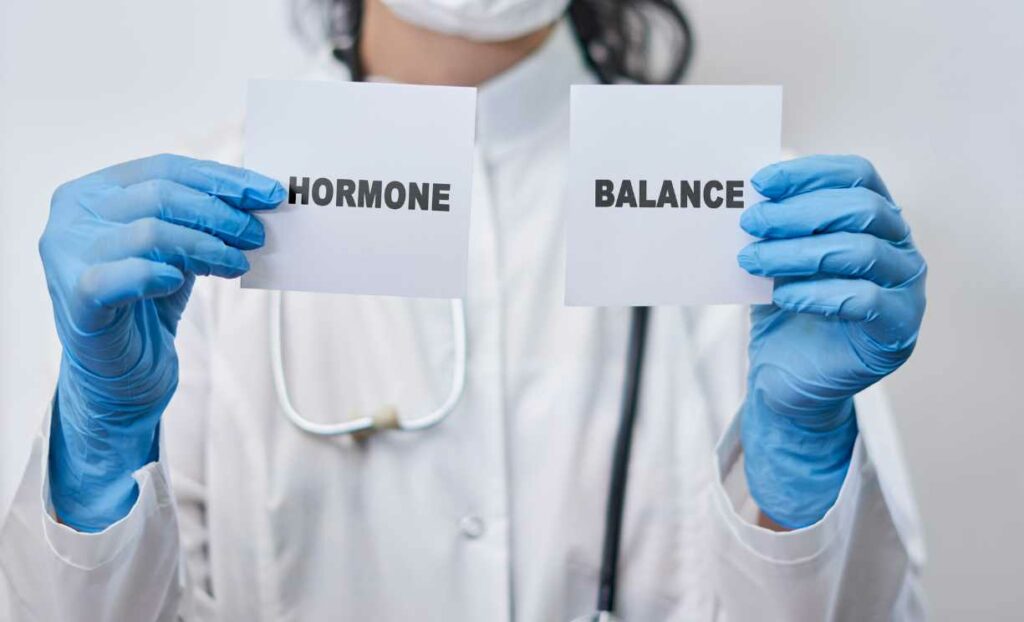Embarking on the journey of womanhood involves a series of transformations, and for some, these changes may occur sooner than expected. Early menopause, or premature ovarian insufficiency, brings its own set of challenges. Understanding the symptoms and seeking proactive solutions is crucial for women facing this unique experience.
Contents
Understanding Early Menopause
Early menopause, also known as premature ovarian insufficiency, refers to the condition where a woman experiences the onset of menopause before the age of 40. Menopause is a natural biological process marking the end of reproductive years, but when it occurs earlier than expected, it brings its own set of challenges. During early menopause, the ovaries stop functioning as they should, leading to a decline in estrogen levels. This hormonal shift triggers symptoms similar to those in traditional menopause.
Early menopause can be caused by various factors, including genetic predisposition, certain medical treatments, autoimmune disorders, or hormonal imbalances. Understanding the symptoms and seeking support from healthcare professionals is crucial for women facing early menopause, allowing them to navigate this unique phase of life with proactive care and tailored solutions.
Symptoms To Watch Out For
Recognizing the symptoms of early menopause is essential for women to navigate this unique phase of life. Here are key symptoms to watch for:
- Irregular Menstrual Cycles: Changes in the frequency and regularity of menstrual cycles can vary. Women may experience periods that become irregular, shorter, or longer, signaling hormonal fluctuations impacting ovarian function.
- Hot Flashes and Night Sweats: Hot flashes are sudden, intense sensations of heat that can affect the upper body, face, and neck. Night sweats involve episodes of sweating during sleep, potentially disrupting rest. These symptoms result from the hormonal changes and can vary in intensity.
- Vaginal Dryness: A decline in estrogen levels leads to changes in the vaginal tissues, causing dryness, itching, and discomfort. This can impact sexual health and may contribute to pain during intercourse.
- Mood Swings and Emotional Changes: Hormonal fluctuations can influence neurotransmitters in the brain, potentially leading to mood swings, irritability, heightened emotional sensitivity, anxiety, or feelings of sadness. Emotional changes can vary in severity and duration.
- Changes in Libido: Hormonal shifts can impact sexual desire and satisfaction. Reduced estrogen levels may contribute to changes in libido, potentially affecting intimate relationships. Open communication with partners and healthcare professionals is crucial.
- Sleep Disturbances: Hormonal imbalances may contribute to sleep disturbances, including difficulty falling asleep or staying asleep. Night sweats can also disrupt sleep patterns, leading to fatigue and reduced overall well-being.
- Cognitive Changes: Some women may experience cognitive changes, such as difficulty concentrating or memory lapses. While more research is needed in this area, hormonal fluctuations could play a role in cognitive function during early menopause.
- Joint and Muscle Pain: Hormonal changes can influence connective tissues, potentially leading to joint and muscle pain. Women experiencing early menopause may notice increased discomfort in their joints and muscles.
Factors Contributing To Early Menopause
Understanding the factors that contribute to early menopause is essential for individuals facing this unique experience. Here are key contributors to early menopause:
- Genetic Predisposition: Family history plays a significant role in early menopause. If a woman’s mother or sisters experienced early menopause, there is an increased likelihood that she may also undergo menopause earlier than the average age.
- Medical Treatments: Certain medical interventions, such as chemotherapy or radiation therapy for cancer, can have a profound impact on ovarian function. These treatments may accelerate ovarian aging and contribute to early menopause.
- Autoimmune Disorders: Autoimmune diseases, where the immune system mistakenly attacks the body’s own tissues, can affect the ovaries. Conditions such as rheumatoid arthritis or lupus may contribute to premature ovarian insufficiency.
- Hormonal Imbalances: Disorders that disrupt the delicate balance of reproductive hormones can lead to early menopause. Conditions such as (PCOS) or thyroid disorders may influence ovarian function and hormone production.
- Surgical Interventions: Surgical removal of both ovaries, known as bilateral oophorectomy, results in immediate menopause. It can contribute to early menopause and is often done as part of preventive measures for conditions like cancer.
- Chromosomal Abnormalities: Certain chromosomal abnormalities, such as Turner syndrome, can affect ovarian development and function, leading to early menopause. These genetic conditions impact reproductive health and fertility.
- Lifestyle Factors: Smoking has been linked to early menopause, accelerating the decline in ovarian function. Additionally, extreme underweight or obesity can impact hormonal balance, potentially influencing the timing of menopause.
- Stress: Chronic stress may influence hormonal regulation and contribute to disruptions in the menstrual cycle. While the direct link between stress and early menopause is complex, stress management is crucial for overall well-being.
- Medical Conditions: Certain medical conditions, such as diabetes or epilepsy, may impact hormonal balance and ovarian function, potentially contributing to early menopause.
How To Deal With Early Menopause?
Dealing with early menopause, also known as premature ovarian insufficiency (POI), can present unique challenges. Here are some strategies to navigate this transition:
- Hormone Replacement Therapy (HRT): Hormone replacement therapy, including estrogen and progesterone, is often recommended to alleviate symptoms of early menopause such as hot flashes, mood swings, and bone density loss. Discuss the potential benefits and risks with your healthcare provider to make an informed decision.
- Emotional Support: Dealing with early menopause can be emotionally challenging. Seek support from friends, family, or mental health professionals to cope with the emotional aspects of this transition. Support groups and online communities can also provide a sense of camaraderie with others going through similar experiences.
- Bone Health: Since early menopause is associated with a higher risk of osteoporosis, focus on maintaining bone health. Ensure an adequate intake of calcium and vitamin D, and engage in weight-bearing exercises to promote bone density.
- Heart Health: Early menopause may increase the risk of heart disease. Adopt heart-healthy habits, including a balanced diet, regular exercise, and maintaining a healthy weight.
- Healthy Lifestyle Choices: Embrace a healthy lifestyle by incorporating regular exercise, a balanced diet, and stress-management techniques into your daily routine. These factors can positively impact overall well-being and help manage symptoms.
- Fertility Options: If maintaining fertility is a concern, explore fertility preservation options such as egg freezing before the onset of early menopause. Discuss these options with a fertility specialist.
- Regular Check-Ups: Schedule regular check-ups with healthcare providers to monitor your overall health. Early detection and management of potential complications associated with early menopause are crucial.
Fertility Considerations
Facing early menopause can have significant implications for fertility. In simple terms, early menopause, or premature ovarian insufficiency, means that a woman’s ovaries stop functioning earlier than expected. This can result in a decreased or complete loss of fertility. The ovaries are responsible for releasing eggs, and when they cease functioning prematurely, the natural ability to conceive is compromised. For those desiring to have children, this can be emotionally challenging. However, fertility preservation options, such as egg freezing, may be explored before the onset of early menopause to preserve the possibility of future pregnancies. Consulting with fertility specialists and healthcare professionals is crucial to understand the available options and make informed decisions based on individual circumstances and goals.
When To Consult A Doctor?
Consulting a doctor is essential when early menopause is suspected or if there are concerns about changes in reproductive health. Here are situations in which it’s advisable to seek medical advice:
- Irregular Menstrual Cycles: If you experience irregular menstrual cycles, especially if they become shorter or less frequent, consult a doctor. Changes in the menstrual cycle can be indicative of hormonal imbalances, including early menopause.
- Symptoms of Early Menopause: If you are under 40 and experiencing symptoms associated with menopause, such as hot flashes, night sweats, mood swings, and vaginal dryness, it’s important to discuss these with a healthcare professional.
- Fertility Concerns: If you are struggling with fertility and suspect early menopause may be a factor, consult a fertility specialist. They can assess your reproductive health and discuss potential options for fertility preservation.
- Family History: A family history of early menopause or conditions that may lead to it, such as autoimmune disorders, can be a reason to consult a doctor for proactive assessment.
- Persistent Symptoms: If symptoms associated with early menopause persist or worsen, seeking medical advice is crucial. Early intervention and management can improve overall well-being.
- Concerns about Bone Health: If there are concerns about bone health, such as a family history of osteoporosis, consulting a doctor for assessments and preventive measures is recommended.
- Emotional Impact: If the emotional impact of potential early menopause is affecting your well-being, seeking support from a healthcare professional, counselor or mental health specialist is beneficial.
- Overall Health Check-Up: Regular check-ups with a healthcare provider can be an opportunity to discuss reproductive health, especially if there are changes in menstrual patterns or concerns about fertility.
Conclusion
In conclusion, navigating the landscape of early menopause involves a nuanced understanding of its symptoms, contributing factors, and proactive solutions. Recognizing signs such as irregular menstrual cycles, hot flashes, and emotional changes empowers individuals to seek timely medical guidance. Early menopause, though challenging, provides an opportunity for proactive health management and a holistic approach to well-being. By staying informed, seeking support, and collaborating with healthcare professionals, individuals facing early menopause can embrace this chapter with strength and confidence, prioritizing their physical and emotional health.
If you are facing menopause related issues, menopause treatment at HerMantra can help. Book your free trial online menopause treatment session now.







I like this site it’s a master piece! Glad I detected this ohttps://69v.topn google.Money from blog